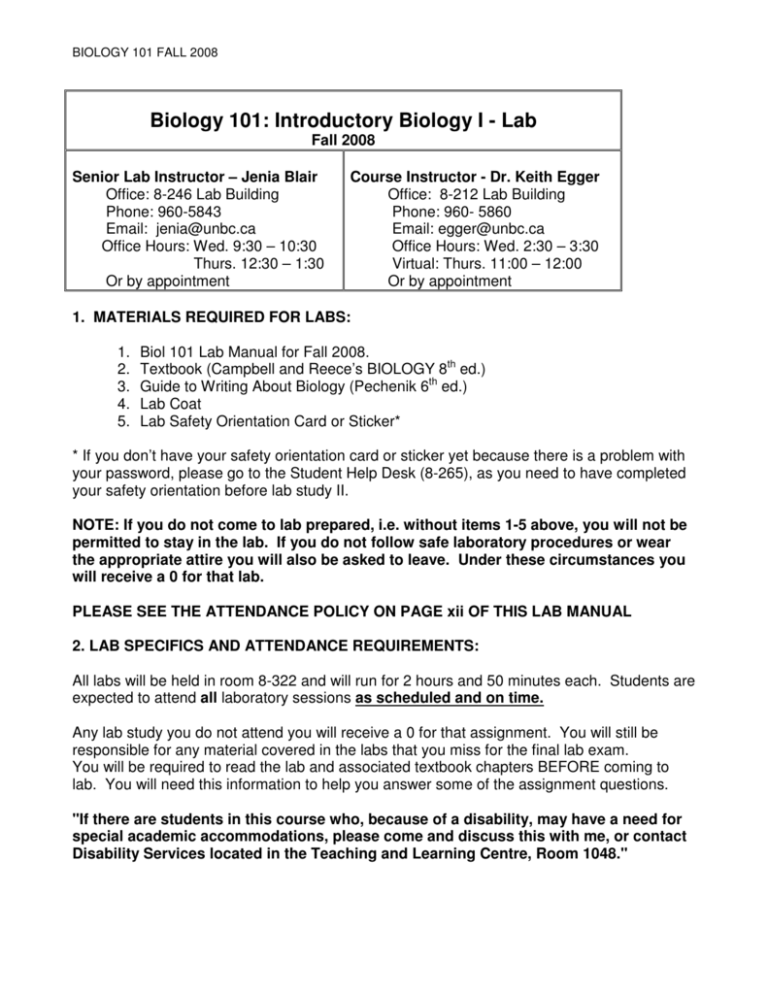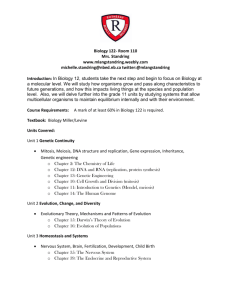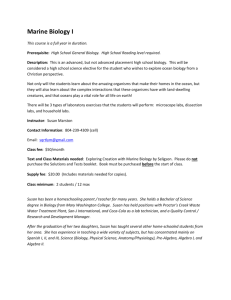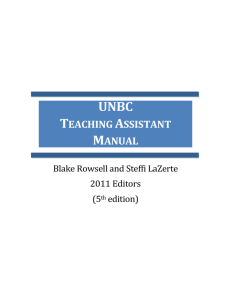BIOL 101 Introductory Biology I
advertisement

BIOLOGY 101 FALL 2008 Biology 101: Introductory Biology I - Lab Fall 2008 Senior Lab Instructor – Jenia Blair Office: 8-246 Lab Building Phone: 960-5843 Email: jenia@unbc.ca Office Hours: Wed. 9:30 – 10:30 Thurs. 12:30 – 1:30 Or by appointment Course Instructor - Dr. Keith Egger Office: 8-212 Lab Building Phone: 960- 5860 Email: egger@unbc.ca Office Hours: Wed. 2:30 – 3:30 Virtual: Thurs. 11:00 – 12:00 Or by appointment 1. MATERIALS REQUIRED FOR LABS: 1. 2. 3. 4. 5. Biol 101 Lab Manual for Fall 2008. Textbook (Campbell and Reece’s BIOLOGY 8th ed.) Guide to Writing About Biology (Pechenik 6th ed.) Lab Coat Lab Safety Orientation Card or Sticker* * If you don’t have your safety orientation card or sticker yet because there is a problem with your password, please go to the Student Help Desk (8-265), as you need to have completed your safety orientation before lab study II. NOTE: If you do not come to lab prepared, i.e. without items 1-5 above, you will not be permitted to stay in the lab. If you do not follow safe laboratory procedures or wear the appropriate attire you will also be asked to leave. Under these circumstances you will receive a 0 for that lab. PLEASE SEE THE ATTENDANCE POLICY ON PAGE xii OF THIS LAB MANUAL 2. LAB SPECIFICS AND ATTENDANCE REQUIREMENTS: All labs will be held in room 8-322 and will run for 2 hours and 50 minutes each. Students are expected to attend all laboratory sessions as scheduled and on time. Any lab study you do not attend you will receive a 0 for that assignment. You will still be responsible for any material covered in the labs that you miss for the final lab exam. You will be required to read the lab and associated textbook chapters BEFORE coming to lab. You will need this information to help you answer some of the assignment questions. "If there are students in this course who, because of a disability, may have a need for special academic accommodations, please come and discuss this with me, or contact Disability Services located in the Teaching and Learning Centre, Room 1048." BIOLOGY 101 FALL 2008 Note: If you need to send an email to any of us, please be sure to use your UNBC account as we have been requested to not respond to hotmail (or other) accounts. Please also specify in the subject line: “Biology 101 question” (or something similar). 3. GRADING FOR THE LAB PORTION OF THE COURSE: Exercises (5) Scientific Paper Assignments (3) #1 – 3% #2 – 5% #3 – 7% Quizzes (2) Lab Exam (comprehensive) TOTAL = = 10% 15% = = 5% 20% = 50% of the course grade. NOTE: YOU MUST PASS THE LAB PORTION OF BIOLOGY 101 IN ORDER TO PASS THIS COURSE. If you have any questions, comments, or concerns regarding the lab or lab material, please see the Senior Lab Instructor (Jenia Blair). 4. ACADEMIC POLICIES. Deadlines - Material is due at the beginning of the lab period on the date set. Assignments will lose 10% of their marks each 24h block they are late (including weekend days), beginning at the time of the deadline (i.e. five minutes late is still in the first 24 hour block and receives the same penalty - please make sure you adhere to deadlines). After 5 days overdue, the material will not be accepted for marks, and you will receive 0 for the assignment. Academic Dishonesty - this includes plagiarism, cheating on exams, misrepresentation of the nature of your involvement on projects, or any other act of academic offences. These are extremely serious, and students involved in any such activities can receive an automatic F in the course. If you are unfamiliar with definitions of any of the Academic Offences, consult this section of the Undergraduate Academic Calendar (page 64 in the 2008/2009 Academic Calendar). Ignorance of these policies will not be accepted as defense. Students found partaking in such activities will receive an automatic 0% on the particular assignment/exam/lab in question. If the instructor deems this offence to be severe enough, it can lead to sanctions that include seeking disbarring the student from the course or the University itself. All matters of Academic Misconduct at UNBC require instructors to submit formal reports to the Dean and Office of Registrar, which will be put on your academic file. Interfering with work of others - this is a form of academic dishonesty. In its more severe form, it is exemplified by hiding or destroying resource material and, thus, obstructing other students from completing assignments. However, less extreme cases include removal of general material without permission making it temporarily unavailable to others who might wish to use. Examples would include removing answer keys posted for all students or hiding BIOLOGY 101 FALL 2008 journals in the library. If you are found partaking in such activities you will get an automatic 0% on that particular assignment, and this will be considered under the requirements for Academic Dishonesty above. 5. COURSE OBJECTIVES: Lab work is an integral part of scientific investigation, and will be emphasized in this course. Labs will introduce students to the chemical and structural nature of cellular life. We will focus on the structure, function and replication of cells. This is a time when students have the ability to investigate first-hand what is being discussed in lectures. It is also a time for students to learn the scientific process of testing hypotheses through experimentation. Students will also learn to report their results in formal, written fashion. By the end of this course you should: 1. Have an expanded knowledge of biological terms and concepts 2. Have the ability to calculate rates, percentages, dilutions etc. as well as basic descriptive statistics such as means and standard deviations. 3. Have a basic understanding of - null hypotheses - basic statistical tests, significance values, p-values 4. Understand the scientific method and how to implement it. 5. Have the ability to write the following parts of a scientific paper and be prepared to build on these in biology 102: - methods section - results section - first stages of a discussion 6. Use microscopes properly. 7. Be able to formulate questions. 8. Understand the importance of multiple trials and replication of data in experimentation. 9. Understand the importance of statistical tests in experimentation. 10. Understand the importance of reliability of results.








